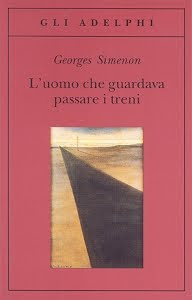I read some time ago a beautiful novel by Georges Simenon, or "The man who watched trains go by."
The book, a mystery-thriller from the contents existentialist, tells the story of poping Kees, a Dutchman who lives in a quiet middle-class town, Groningen, and that leads to the classic monotonous life, without great pretensions, however, quite serene and reassuring the family that is out. The most fun for the protagonist is the game played with friends in the chess club.
His boss, a Julius de Coster one night, confides in the failure of the factory where he works (a factory where poping naval supply is used), and all of a sudden click in the "Mr poping " a spring that leads him to do the most unthinkable things in the eyes of others, " maman" (his wife who suddenly realize they do not like) of his daughter, and all the hypocritical people that filled his useless life so far. So
Trains has seen continually switch from its Groningen and he has always envied the life nestled between the cars, the hopes of traveling, which are typical of those who took his first steps to a new place, this time taking away too. Paris will be his goal.
The following is the story of a man suddenly free to leave everything and everyone to live a new life where they could give free vent to his innermost passions and boldly held at bay for too long. (So \u200b\u200bfar the resemblance to the protagonists of the novels of Italo Svevo is clear, that the man "imprisoned" in his ineptitude that he is not satisfied in full, but allows him to live a peaceful life even as a spectator - in the audience also Svevo disintegration of others ...)

Georges Joseph Christian Simenon (Liège, February 13, 1903 - Lausanne, September 4, 1989) Belgian writer French language known for having conceived the series of detective Inspector Maigret
accidentally kills a woman he dreamed and planned to have sex and wanted by the police, found refuge and protection to a group of criminals and car thieves, again threatening to kill a prostitute he has fallen in love, but eventually left terribly alone in his freedom now only "constructive" and with his new identity (the identity is another theme important to the novel that makes poping the alter ego of Pirandello Vitangelo Moscarda or Mattia Pascal ...) which is forced to wear to avoid recognition by police in Paris.
In fact, its most important game of chess played with just the police, using the press in Paris, and frantically trying to balance his "mask" in the eyes of the beholder, limiting and eliminating inconsistencies and filing false truth that journalists write about him.
 E 'evident in all of this delusional behavior poping. Paradoxically, the feeling you get from reading this novel (which can be read at various levels) is that in the end, you feel almost at home in the twisted mind of the protagonist, much to ask
E 'evident in all of this delusional behavior poping. Paradoxically, the feeling you get from reading this novel (which can be read at various levels) is that in the end, you feel almost at home in the twisted mind of the protagonist, much to ask "E 'poping the fool?"
You end up rooting for him, somewhat as with Raskolnikov in "Crime and Punishment" by Dostoevsky , (a novel that I adore), where half the novel you drunk a little of the doctrine nietzchiana super-man, even if a bit too easily adapted to the needs of the protagonist, and almost ends to justify the murder of the old usurer and share the crazy gesture (caused by a noble sentiment, though) of a poor law student, Raskolnikov for the note, which goes against the whole world and especially against the hypocrisy and the laws of morality prevailing.
And that is exactly what happens by reading the strange story of Kees poping.
We reflect on the precariousness of existence and the human mind and one wonders whether it is more comfortable in his own right to live life full of good rules and good fake smiles rather than take the train and escape to where anything is possible. ..
Damiano Franco
0 comments:
Post a Comment